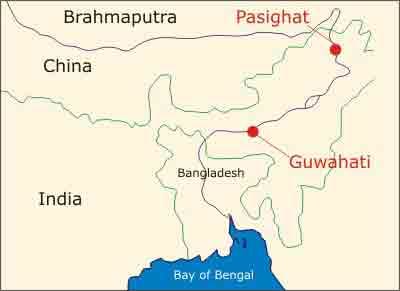Water 'nearly dries up in Arunachal'

The river Brahmaputra that originates from Tibet in China has almost dried up at a town in northeastern Indian state of Arunachal Pradesh, a state government spokesman says.
People of century-old Pasighat town in East Siang district found that the water level of the river receded too much, said Tako Dabi in Itanagar, the capital Arunachal, Wednesday night.
He expressed apprehension that China could have diverted the water of the river, which is known as Yarlong Tsangpo in Tibet, or there could be some artificial blockade due to which this has happened, PTI reports.
On June 9, 2000, the water level of the Brahmaputra, locally known as Siang, rose suddenly by 30 metres and inundated almost the entire township.
The sudden flood destroyed properties and claimed seven lives following the collapse of a hydropower dam in Tibet, said Tako Dabi, also the political adviser to Arunachal Pradesh Chief Minister Nabam Tuki.
He claimed to have inspected the dried bed of the river.
The Indian government and its agencies like the Central Water Commission should immediately conduct a study in collaboration with the state government to find the crux of the problem, he added.
Yarlung Tsangpo, the highest river in the world, is a watercourse that originates at Tamlung Tso Lake in western Tibet, southeast of Mount Kailash and Lake Manasarovar.
It later forms the South Tibet Valley and Yarlung Tsangpo Grand Canyon, before entering India at Tuting in Arunachal, takes the name of Brahmaputra in Assam and enters Bangladesh, writes our New Delhi correspondent.
The 2,900-kilometre river joins the Meghna before emptying into the Bay of Bengal, along the way supplying water to hundreds of millions of farmers and residents.
"It was shocking to find the Siang river drying up and patches of sand visible on its bed in a very large stretch close to Pasighat town," local state lawmaker Tako Dabi told AFP by telephone from the scene.
"We suspect the sudden drying up of the Siang could be a result of China either diverting the river water on their side or due to some artificial blockades somewhere in the upper reaches," added Dabi, also a former home minister.
He estimated the flow was about 40 percent of its normal strength.
"The water level has reduced by roughly three metres in the past few days and we really don't know the reason," K Apung, an engineer at the State Water Resources Department in Pasighat, explained to AFP.
Video footage from the scene showed the Siang -- normally a gushing torrent several kilometres wide at Pasighat, according to Dabi -- reduced to flowing in narrow channels in a large sandy riverbed.
The problem was highlighted on the day the Chinese Foreign Minister Yang Jiechi held talks in New Delhi with his Indian counterpart SM Krishna.
India is extremely nervous about the danger of its giant northern neighbour diverting rivers that originate in Tibet and flow into India, or disrupting their flow with hydroelectric plants.
The two countries have held frequent talks about the issue at the highest level.
"We have been assured that nothing will be done which affects India's interests adversely," Indian PM Manmohan Singh told the upper house of parliament last August.
Energy-hungry and water-deficient China is building hydroelectric facilities on the Yarlung Tsangpo. India says it has received assurances they are "run-of-the-river" projects rather than dams which would disrupt the flow.
"Our satellite pictures convey that no such activity of any storage facility is being worked out by the Chinese authorities," Krishna told reporters yesterday after his talks with his Chinese counterpart.
He said that in light of the media reports about the river's flow, "we will get our ambassador (in Beijing) to check it."
A senior official at the water resources ministry in New Delhi, who asked not to be named, denied that there was any problem.
"The river drying up is a figment of their imagination," he told AFP.
Brahma Chellaney, an expert in New Delhi who has written extensively on water issues in Asia, said the alarm in Arunachal warranted further investigation.
He said China had not signed any water-sharing agreements in accordance with international norms with its many downstream neighbours who are dependent on the vast fresh water flows from the Tibetan plateau.
"If you look at the pattern, they (China) build dams and initiate them very quietly," Chellaney told AFP, citing the experience of countries downstream on the Mekong river.
India and China have decided that 2012 will be the "India-China year of Friendship and Cooperation" in a bid to overcome mutual mistrust and suspicion that continues to bedevil their relations.
The two Asian giants have an unresolved border dispute that was the cause of a brief but bloody war in 1962.
China claims almost all of Arunachal Pradesh as its own territory.

 For all latest news, follow The Daily Star's Google News channel.
For all latest news, follow The Daily Star's Google News channel. 



Comments